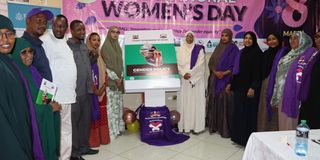Boost for fight against GBV as Wajir launches protection centre

Wajir Governor Ahmed Abdulahi's wife Rukia Abdinasir (fifth right) while marking International Women Day in he town.
The fight against gender-based violence (GBV)in northern Kenya got a boost following the launch of the first GBV centre to accommodate victims and provide them with special care.
Speaking to journalists at the Grand Oasis hotel while marking International Women’s Day, Wajir Governor Ahmed Abdullahi’s wife, Ms Rukia Abdinasir, said the centre will give victims privacy “as everyone will throng the wards at the general hospital when GBV news breaks”.
"Victims are in distress and trauma and admitting themselves to the same facility with general patients. We want to give the family members optimum space," said Ms Abdinasir, who launched the centre.
In the current drought in Wajir, brought on by six failed rainy seasons, women’s welfare will be top of the agenda after Governor Abdullahi initiated a revolving fund and a disability fund, she said.
"We will walk with the victims in their trying times and make sure that perpetrators are brought to justice. Times where discussions happened outside the court system on matters concerning rape are long gone," said Ms Abdinasir.
The centre will offer critical, medical, and social support under one roof and provide a "safe haven" for the victims.
County Health Executive Halima Ali said her office equipped and staffed the centre, saying the department receives two cases of GBV a week and some measures had to be put in place.
Ms Abdinasir said women in the Somali community are breadwinners, some single mothers, and they are an integral part of what’s holding the community together.
"As we are all aware, we are in the middle of a ravaging drought. This has truly had devastating effects on women and girls who have been playing significant roles in their families. I firmly believe we must join hands to ensure maximum support to our women and girls with strategic initiatives to ensure the women are safe and healthy and our young girls access education," said Ms Abdinasir.
According to the Wajir East police station gender desk, 65 per cent of cases reported to the police are related to women, and include rape, attempted rape, child rape, early marriage, and school dropouts.
Ms Abdinasir, who also paid a visit to the women’s prison, addressed the inmates before donating dignity kits and refreshments.
She further extended her support to petty offenders, where she pledged to assist in paying the fines for a few of the inmates “to give them a second chance in life”.
Mr Abdi Billow, a human rights champion, urged the Wajir government to hold a mass wedding because weddings are expensive.
"I urge the parents to make marriage simpler and cheaper. The number of unmarried youth is high," said Mr Billow.

Pastoral women from Isiolo, Samburu and Marsabit counties during a peace processions at Archers Post in Samburu East on March 8, 2023 to mark International Women's Day.
In Nyeri, the government was asked to develop a policy framework to ensure women are fully integrated in the digital space to bridge the digital gender divide.
National Security Adviser Monica Juma said gender equality is not only a fundamental human right, but also a keystone of a prosperous, modern economy that provides sustainable inclusive growth.
Dr Juma was addressing participants during an online celebration of the International Women’s Day organised by the Karatina University in a speech titled
“Leveraging innovation and technology for the protection and empowerment of women”.
She appealed to the government to come up with and share policies, actions and national practices that have an impact in bridging the digital gender divide.
“Today, the digital transformation provides new avenues for the economic empowerment of women and can contribute to greater gender equality. The internet, digital platforms, mobile phones and digital financial services offer opportunities for all and can help bridge the divide by giving women the possibility to earn additional income, increase their employment opportunities, and access knowledge and general information. We need to seize this opportunity to foster greater gender equality in the labour market, boost economic growth and build a more inclusive, digital world,” she said.
Dr Juma said the society should recognize that gender equality is essential for ensuring that men and women can contribute fully for the betterment of society first committed to “women’s full economic and social participation”.
She noted that women are under-represented in ICT jobs, top management and key academic careers.
She asked the government to explore the factors that underpin the digital gender divide, bolster the evidence base for policy making and provide policy directions that enables and supports equitable participation of women in the digital economy.
Other speakers during the forum were Karatina University deputy vice chancellor Peninah Obutho who supported Dr Juma’s sentiments that more women should be involved in the digital space, to increase diversity and bring value, both social and economic.
Most other speakers, including some from other countries noted that innovation activities are at the core of the digital transformation and it is in the interests of respective countries to come up with activities that help policy makers take a comprehensive approach to promoting gender equality.
Women in various parts of the country marked the International Women Day.
In Isiolo, the women held a procession in the town against GBV.






